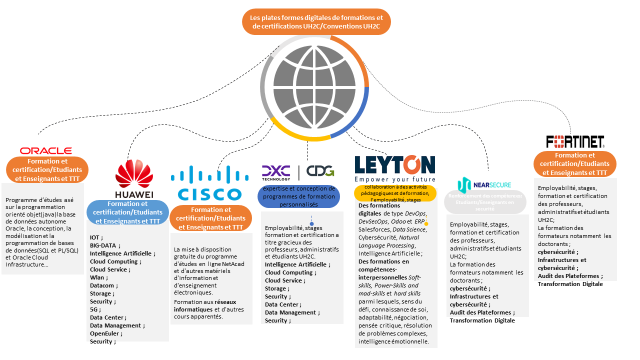PUBLIC/PRIVATE Partnership
The Public/Private partnership encompasses administrative contracts through which a public entity entrusts a private partner with all or part of the design, construction, financing, operation, and maintenance of public infrastructures and/or associated services.
Public-private partnerships (PPPs) are one of the tools that universities can use to help establish better academic and public services. They represent the university's interface with the socio-economic environment, aimed at developing close relationships to better identify its needs in terms of training, R&D, consulting, expertise, and studies. This involves identifying promising research themes and organizing thematic meetings with socio- economic operators around issues of common interest.
In order to promote public-private partnerships within UH2C, the University has implemented the following actions:
- Establishing greater interaction between the University and the socio-economic world in all areas of mutual interest.
- Setting up a national framework for certifying transversal skills in: languages, communication techniques; IT, entrepreneurship, and project management (See IT Partnership projects).
- Organizing conferences and workshops on entrepreneurship: creation, organization, management of businesses, etc.; as well as programming internships and company visits with report presentations.
- Organizing meetings and forums bringing together companies and the Teaching/Administrative/Student body, seminars, and training cycles for business creation and the development of entrepreneurial spirit.
- Promoting the dynamics of clusters.
IT Agreements
Aware of the crucial importance of integrating and utilizing Information and Communication Technologies (ICT) in higher education and scientific research, as well as their positive impact on the quality of education and research, UH2C continuously collaborates with various partners in the field of ICT.
Hassan II University of Casablanca encourages learning through digital resources by creating an E-learning platform or LMS (Learning Management System): Digital technologies are transforming the way of teaching—at varying degrees—in all fields, while digital itself becomes the subject of dedicated training.
For universities, integrating new modes of learning is essential. Virtual reality, augmented reality, and virtual classrooms will soon be part of all curricula, similar to those focusing on digital skills.
Thus, the University is called to:
- Support trainers throughout the transformation process and encourage them to renew resources and educational content to better adapt to the issue of pedagogical innovation;
- Support students and help them take greater control of their learning, in class and outside of class, by offering a dedicated space for guidance, training, and collaboration through new immersive technologies, essential tools for ensuring effective training for tomorrow’s professions and fostering self-learning and "Hard-skills";
- Rely on R&D to evolve and improve learning by measuring, through surveys of students, the impact of e-learning on cognitive methods with immersive learning, thereby promoting the university’s methodological rigor sought after by companies in R&D.
Agreements with partners Huawei, VMWare, Apple, and Cisco aim to provide training and instructor certificates (Train To Trainer) for researchers and students at UH2C, to strengthen skills training in the field of information and communication technologies within the University institutions. These training sessions and certificates cover several aspects: Networking, Systems, Cloud Computing, and Security…
The courses for certifying students can be either in-person or online.
As part of the ministerial program Pacte_ESRI 2030, framework agreements have been signed between HUAWEI, CISCO, DXC, LEYTON, NEARSECURE, ORACLE, FORTINET, and Hassan II University of Casablanca, aimed at supporting the training offer in the "CODE 212" centers..
Partners CODE212:

